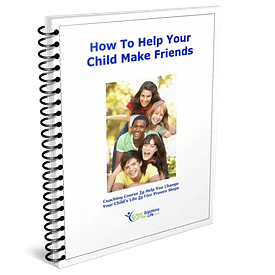If you’re a parent, and looking for ways for how to help your child make friends, you’re in the right place.
Chances are you were drawn to this article because you’ve seen your child – or one you care about – seemingly depressed, disconnected from other children and isolated.
It’s absolutely heartbreaking, isn’t it?
I’ve witnessed the effects of loneliness in children too many times… you see it in their eyes, you hear it in their voice and you feel it in your heart if, and when, they will talk to you about it.
Connecting With Others
As human beings we need healthy relationships with others, and when we don’t have them we can easily become unhealthy emotionally, physically and mentally.
So we all need to have friends… good friends.
And it doesn’t take a lot of friends to make a big difference in a person’s life. Just one or two close friends can be life changing.
That’s especially true for children as they grow up and develop into young adults.

I think most of us know what it’s like to be lonely from time to time, but extreme loneliness for a child can be devastating.
I’ve seen several children deal with loneliness while I was doing volunteer work with kids who had suffered from abuse or neglect.
I wanted to do something to help put an end to that problem.
So, I decided to create a simple way to help children connect, and make friends, in order to try and fill the void left by loneliness. I wanted to offer a simple solution that they could apply to their lives in small steps.

I did some research and talked with child psychologists to come up with a basic game plan for kids that would help them make new friends. After teaching the plan to small groups of children in their early teens, I know it works.
Right now you may be in the research stage looking for some pointers to see if you can offer a quick fix for your child, so I’ve pulled out some of the important points from my program that can help you teach your child how to make new friends.
There Is Hope, And There Is Help… Even If Your Child Is Shy or Socially Awkward.
There are certainly a lot of intangibles like personality, confidence and other factors that come into play when making friends. However, there are also skills and processes that can be easily learned and implemented that will help a child make new friends.
And once an approach produces one friend it will be easier to duplicate it to make more.
What I’m going to do here is to give you some of the basics that will help you coach your child so they can make new friends. This isn’t rocket science, and if you will mentor your child they will see success much faster.
Not only will this help your child make new friends, it will also build a deeper, stronger bond between you and your child as you encourage them through the process.
In the “Resources” section towards the end of this article you’ll also find something that will show you how to help your child make friends quickly and easily.
Here’s What We’re Going To Cover

Just like teaching a child to play baseball, soccer or some other activity, they will do better when someone takes a personal interest and gives them individualized attention… like you.
What I’m going to give you here is a basic framework to coach your child through some of the emotional, physical and mental aspects of making friends using practical examples.
Every child is a unique individual, and this information can be adapted to their specific situation.
So, let’s get started.
This post contains some affiliate links. You can see my disclosure about affiliate links here.
1) It Starts With A Plan

For instance, their friends would come from local kids in the neighborhood or ones that they came in contact with at school.
That’s fine in many instances, but taking a proactive approach can help your child find friends that are a better fit for their personality and maybe offer a more rewarding relationship.
So, to be intentional think about this: what defines the type of friends your child would enjoy spending time with the most.
- Personal attributes (honesty, loyalty, sense of humor)
- How does your child like spending their time (sports, hobbies, games)
- What does your child want to be when they grow up (doctor, teacher, musician)
Basically, you’re trying to define the pond where you want to fish for new friends. Instead of waiting for potential friends to come to your child, your child should be proactive and look for them instead.
You Want To Make Your Plan Based On The Following.
- What kind of person fits your child’s “best” friend profile. Define them using criteria like I’ve given you above.
- Where can you find these kinds of children?
- When will you do the tasks involved in your plan?
- How will you go about developing and implementing your plan?
Don’t over think the process of making your game plan. Keep it simple.
An Example Of A Plan For How To Help Your Child Make Friends

- What kind of people did I want to meet: Pilots and others interested in flying.
- Where could I find people like that: At a local airport.
- When should I try to meet them: On weekends when they were taking joy rides in their airplanes.
- How would I implement my plan: Go to the local airport on Saturday mornings and walk around admiring people’s airplanes, ask questions and start conversations.
It was as simple as that. And it worked.
I ended up talking with several pilots who had their own personal airplanes, and I became friendly with a few of them.
Then I offered to wash their airplanes and in exchange they would take me up for short flights with them. Some even let me fly their airplanes a little bit.
I discovered that I really did enjoy the flying culture and soon started taking flying lessons.
2) Coaching Your Child
One of the big benefits to coaching your own child is that it provides a great opportunity to create a stronger bond with them.
The conversations you’ll have will allow you to get a deeper understanding of your child’s mindset and vulnerabilities, and you can share some of your own while you were growing up. Those kind of interactions will certainly create stronger bonds.
One of the best ways to bond with anyone is to simply have fun with them. So, you need to make this experience fun for your child as opposed to a serious tutorial.
Shed the role of authoritarian and take on the persona of a friendly coach with a sense of humor. Make this friend-making process a light hearted pursuit where you’re both in it together as a team.
Working On Your Child’s Friend-Making Game

Preparing for the physical parts with your child is probably the easiest because it mainly involves performing the tasks involved with your plan.
The physical part would also include the role playing exercises you would go through with your child to prepare them to meet new people and hold conversations. We’ll talk more about that a little later.
The mental aspects can be a little more tricky as you teach your child what to expect as you both work your way through the plan.
Managing Your Child’s Expectations
One of the most important things is to manage your child’s expectations. This is where the “fishing” mentality comes into play.
Your child is not going to land a new friend every time they cast their lure into a pond of potential friends. It just doesn’t work like that… making new friends (like many things in life) can be a bit of a numbers game.
Your child will connect with some and not with others. That’s okay.
And frankly, every child they meet won’t be a good fit as a friend, so “the one that got away” might be a good thing. Teach them to move on to the next opportunity if the last one didn’t work out.
All they’re looking to do is make one good friend at a time.
Another important part of the mindset to work on is the confidence factor.
The emotional aspect will probably be the most difficult to deal with because through the ups and downs… highs and lows… successes and failures… there are bound to be some hurt feelings.
When that happens your job is simply to be there with a warm hug, listening ears, an open heart and words of encouragement. Then you keep your child moving forward in your game plan.
3) How To Help Your Child Make Friends By Improving Conversation Skills

Like a good story, a good conversation has three parts: a beginning, a middle and an end.
Helping your child in all three of these conversational phases will go a long way in helping them make friends.
Here are some pointers.
The Three Stages Of A Conversation
Let’s look at three phases when initially getting to know someone new: The approach, the introduction and icebreakers.
When your child approaches someone they don’t know they should do so in a casual, non-direct way.
What I mean by that is that should they make eye contact with someone from across a room they should not head for them right off the bat and start chatting them up. That can make people feel uncomfortable.
Instead, casually approach in an indirect path by making eye contact with others until they are close enough to make eye contact again and introduce themselves.
Beginning The Conversation
After your child introduces themself they can start with an icebreaker question.
Good ice breakers often involve topics that are related to the reason they are both at the place where they are meeting. It could be a school function, a sporting event or maybe at a shopping mall.
For instance, let’s say your child is taking your dog for a walk at a dog park. They might say something like, “That’s a beautiful dog. What kind is it?”
Keeping The Conversation Going

For instance, “Your dog is so well behaved. Do you work with them a lot?”
One thing you can do is to help your child come up with some ice breaker questions for opportunities they may have for meeting new people.
Another way to keep a conversation going is to say something like, “Tell me more about ________.” The fill in being the main topic of their conversation.
Listening Is An Important Part Of Being A Good Conversationalist
A good thing to focus on regarding conversations is to help your child become a good listener.
You may have heard it said that we have two ears and one mouth, so we should listen twice as much as we talk.
It’s easy to become a good listener when you take a genuine interest in the other person and try to learn about them. And a good way to learn is to ask friendly questions without getting too personal.
A good conversation is a two-way street. So, teach your child to offer up information about themselves when appropriate so that the conversation doesn’t get too one sided. You don’t want it to come off like it’s an interview.
Bringing A Conversation To A Close
After even a brief conversation your child should have a general idea if it’s going well, or not.
If the conversation is awkward, or it’s clear that no connection is made, it’s time to move on. A good way for your child to do that is to look the other in the eye, thank them for the conversation and have your child make their exit.
One example would be to say something like, “Well, I better let you go. I don’t want to take up too much of your time. Thanks for talking with me.”
However, if the conversation is going well, and it’s drawing to a natural conclusion, it’s time for your child to issue an invitation to reconnect in the near future. We’ll talk about that next.
Role playing with your child is a great way to help them become a great conversationalist. And it will help them gain confidence, as well.
Bring up a situation they may encounter, prepare them for the possibilities of how a conversation could go, give them ideas for ice breaking and follow up questions to ask and then act it out with them.
This is where your coaching can really help your child.
4) Taking The Next Step

An example may be something like meeting at an event, or getting together to discuss a common interest. The invitation should be made in a specific way regarding the activity, the day, the time and the place.
A good start would be something like meeting at a neutral location (a local park, shopping mall, coffee house, etc.) to do, or discuss, something of mutual interest. Make the invitation a casual thing for an activity that doesn’t take much planning.
Dealing With Rejection
If your child gets a “no” in response to the invitation, see if there’s a time conflict and try to reschedule. And if the other child doesn’t seem interested in the suggested activity then offer a different one.
If there’s still no interest then be friendly, polite and move on. Your child can say something like, “I’m sorry you can’t make it. I’ve enjoyed meeting you.”
You can offer an invitation once, maybe twice, but never three times or more. Doing so will make your child look desperate, and can make the other person uncomfortable.
Teach your child that getting turned down isn’t a big deal and they should then turn their focus on another prospect.
As a coach you should practice with your child in issuing invitations and receiving a response, positive and negative, to give your child practice in dealing with both.
As I mentioned earlier, making friends can be a numbers game. After meeting 10 – 12 new people they may have good conversations with five, or six, of them and one or two may become a pretty good friend.
5) 10 Ways To Be Popular

Following are some of the most important qualities most people look for in their friends.
A good friend should…
- Be fun to be with by showing a good sense of humor and not taking themselves too seriously.
- Make the other person feel good about themselves by being encouraging, giving honest compliments and recognizing the good qualities in a person and letting them know you appreciate those qualities.
- Be authentic: Transparent, honest, vulnerable at times and have integrity.
- Be trustworthy.
- Not gossip… keep things that your friends share with you confidential. An exception would be if they’re doing something that puts them, or someone else, in danger.
- Be loyal by sticking with your friends through the bad times as well as the good.
- Be reliable by keeping your word and doing what you say you’ll do all the time.
- Be forgiving… don’t hold grudges.
- Look out for your friend’s best interests; watch their backs.
- Be generous with your time, resources and in sharing your heart.
Resources – How To Help Your Child Make Friends
Step-By-Step Guide To Help Your Child Make Friends

Your child can say goodbye to lonely days and the feeling of being alienated and disconnected.
They’ll develop a new ability to connect with others effortlessly, and gain a healthy confidence that will help them feel at ease around others.
And parents like you will get peace of mind knowing that your child has the ability to make friends.
You’ll also build a stronger bond with your child in the process as you spend quality time together while coaching them to success.
If you’re a busy parent, this no-frills system gets right to the point to give your child a solid foundation in the social skills, and techniques, that produce friends quickly.
Click here to learn more to help your child make friends.
Conclusion – How To Help Your Child Make Friends
Helping your child make new friends doesn’t have to be difficult if you take a coaching approach and give them some basic social skills to work with.
You start by helping your child make a plan and then coach them like you would if you were teaching them to play a sport like basketball.
Instead of practicing free throws you would practice the art of conversation. Including how to approach people they don’t know and how to deal with the mental and emotional aspects. You’ll also work on setting their expectations and dealing with disappointment.
Now that you’ve finished How To Help Your Child Make Friends, take some time to think through how you can help your child develop a plan that would work for their unique personality and situation.
The sooner you start the sooner your child will have all the friends they want and a full, rich social life.
What do you think?
Let me know your thoughts in the comments. And add some of your own ideas that you think will help other parents to help their children make new friends.
- Prostate Issues 101 – Causes, Symptoms & Treatments - February 9, 2023
- Brushing Up On Dental Health – The Ultimate Guide To A Dazzling Smile - February 6, 2023
- How To Overcome Social Anxiety Disorder - August 20, 2020


